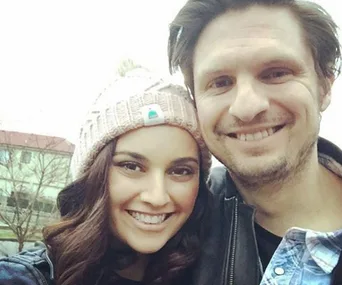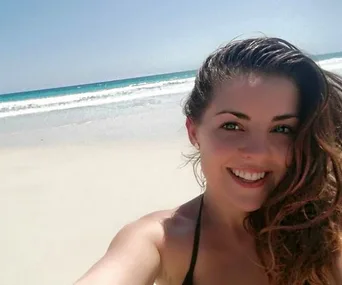Tori Dent, 28, from Brisbane, Qld, shares her story with Take 5:
Trying to walk to the taxi from the wharf, the world felt like it was spinning.
“Does anyone else feel dizzy?” I asked my friends.
But none of them did.
It was March 2020.
I’d been partying with my mates and my sister, Maddison, 23, and we’d just returned from a P&O cruise to Vanuatu amidst the outbreak of COVID-19.
I attributed the vertigo to our time at sea, and hoped some rest would restore my land-legs.
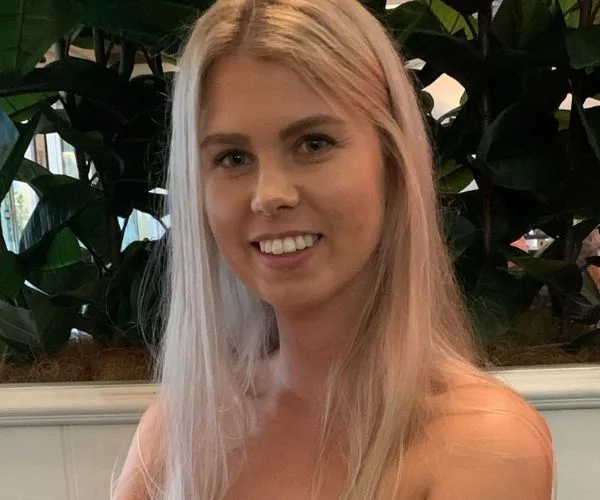
In March 2020, I’d just returned from a cruise and was feeling dizzy. (Image: supplied)
But over the next two weeks, the spinning feeling would come and go, a little worse each time.
On the morning I was due to return to my work as a nurse, it was so bad I couldn’t stand without help.
This must be more than seasickness, I thought.
“I don’t know what’s wrong with me,” I told my boss down the phone.
“Why don’t you come in for a COVID test,” she suggested.
I didn’t have COVID symptoms, but figured it was worth being sure.

The doctors took me in for an MRI. (Image: supplied)
Maddison drove me to hospital and helped me walk in.
In the waiting room, the spinning sensation became increasingly sickening until finally, I threw up.
A passing doctor was startled.
“Come with me,” he said urgently.
I was immediately tested for COVID, which came back negative, followed by a CT scan, which also came back normal.
The doctor arranged for an MRI scan.
Maddison looked at me, her eyes wide with worry.
“They’re just checking all the possibilities,” I reassured her.
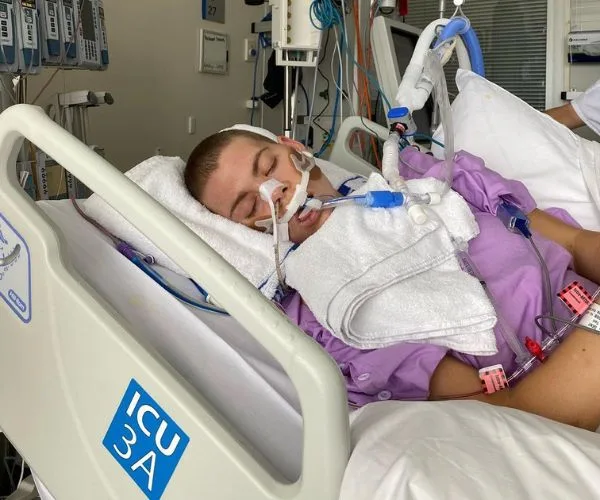
I had no idea what I was in for. (Image: supplied)
Eventually the doctor returned with the MRI results looking serious.
“We’ve found a benign tumour on your brain,” he said solemnly. “But it’s slow-growing.”
Although I was shocked, I told myself I’d get through it.
Maddison sniffed back tears.
“Stop that,” I said, gently squeezing her hand. “I’ll be okay.”
I was kept at the hospital over the next week and given regular updates by doctors.
They told me the tumour was inoperable as it was too close to vital parts of my brain, but my symptoms could be managed through medication and diet.
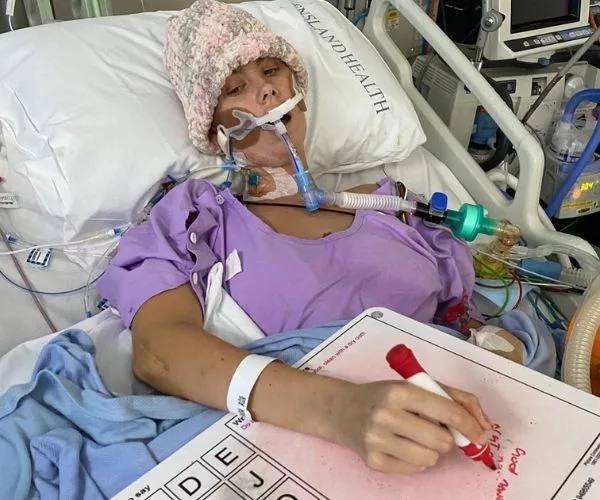
I needed surgery to save my life. (Image: supplied)
I took tablets to ease the spinning, but each day, I only felt worse – having trouble swallowing, getting double vision, and before long, I couldn’t stand at all.
Another scan revealed bad news.
“We need to do surgery, Tori,” the doctor said.
“I thought it was inoperable?” I responded groggily.
“Yes,” he said, “but the tumour’s grown by a third in a week. If we don’t operate, you’ll die.”
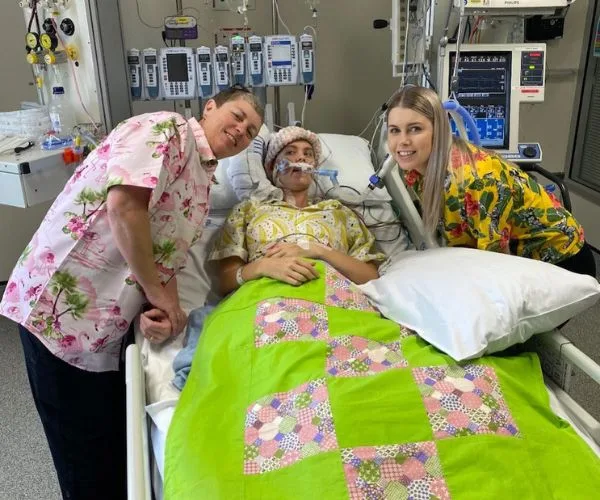
With Mum and Maddison in ICU. (Image: supplied)
Although the situation was graver than anyone anticipated, I convinced myself it wasn’t serious.
COVID meant only Maddison and my mum, Karen, could visit briefly before my surgery.
“I can tell you’re not worried,” Mum, who’s also a nurse, said. “So, I’m not worried.”
After the op, I could barely talk and couldn’t eat solid food, but I was just glad to have survived.
Thankfully, doctors had removed 80 per cent of the tumour.
Two weeks later, I was allowed home for day leave but when I returned to hospital, I was gasping for air, having choked on my own vomit.
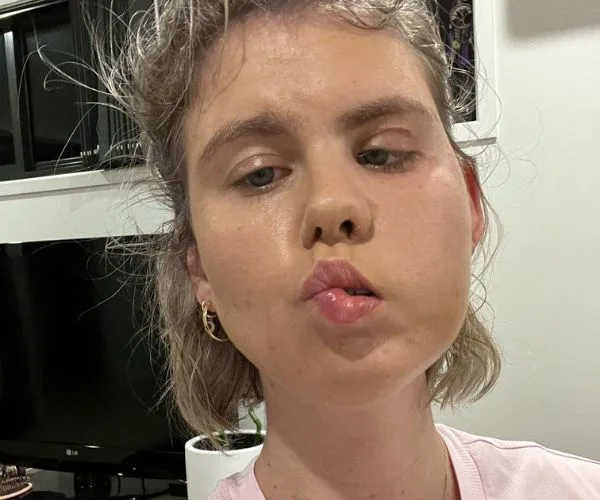
The lesion had a huge effect on my facial muscles. (Image: supplied)
More tests revealed my tumour had grown back rapidly.
“I’m afraid it’s expanded to 4cm since the operation,” the doctor told me.
It had only been 3mm when they first found it.
Maybe everything won’t be ok, I thought.
After that, I lost the ability to walk, talk and swallow my own saliva.
In ICU over the next 19 days, I was fed through a tube as doctors tried to stabilise my condition.
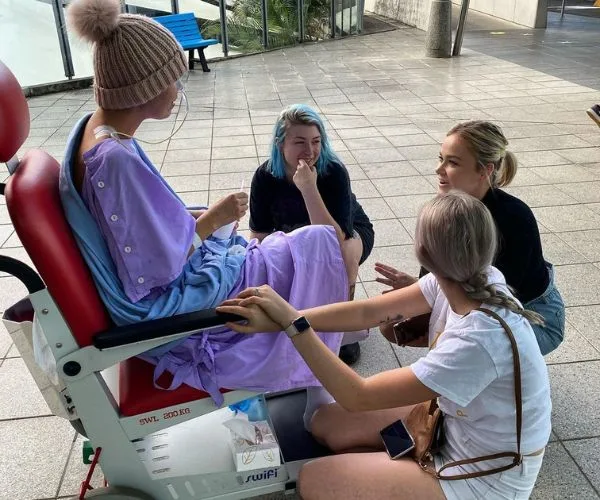
My friends were shocked when they came to visit. (Image: supplied)
When COVID restrictions finally allowed limited visitors, four of my closest friends, Casey, Jane, Toby and Ash came to see me.
I could tell they were shocked by my appearance.
My head had been shaved, I had a tube in my throat for breathing and the tumour had weakened the muscles in the left side of my face.
Although I couldn’t talk to them, they gave me much-needed words of encouragement.
“If you start small,” Casey said. “You’ll pull through.”
I held onto those words during my many months in hospital and rehab.
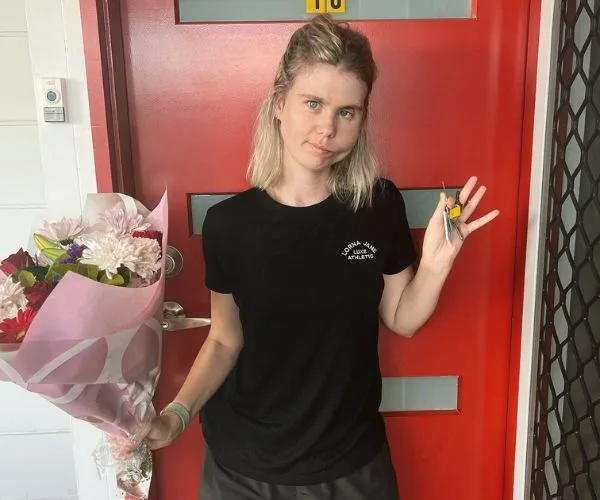
I was finally able to move into my own place. (Image: supplied)
At first, doctors didn’t think I’d make any improvements, but slowly, I learned to swallow, move my arms, talk, and stand up again.
“We’ve been monitoring the tumour,” one doctor said. “We can’t explain it, but it’s shrinking.”
My determination was working!
I was smiling with happiness but knew, with the left side of my face unable to move, only half of it was showing.
I will get out of here, I promised myself, dreaming of the simple things, like having breakfast at a cafe again.
Fourteen long months after I first went into hospital, a registrar came in with an update.
“You can go home now, Tori,” she said.
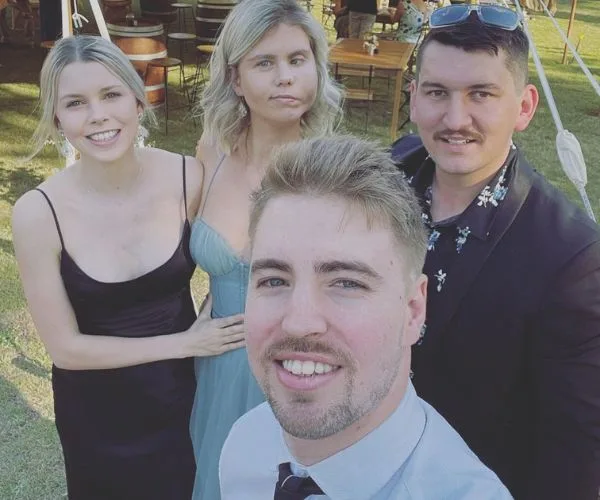
I’m out attending weddings and parties again. (Image: supplied)
Incredibly, my tumour had shrunk to be smaller than when it was first found.
I felt like I’d been granted a second chance at life.
My first milestone was visiting a café.
“An omelette never tasted so good!” I told my friend.
I was still able to live on my own but a support worker helped me get to appointments and do my housework.
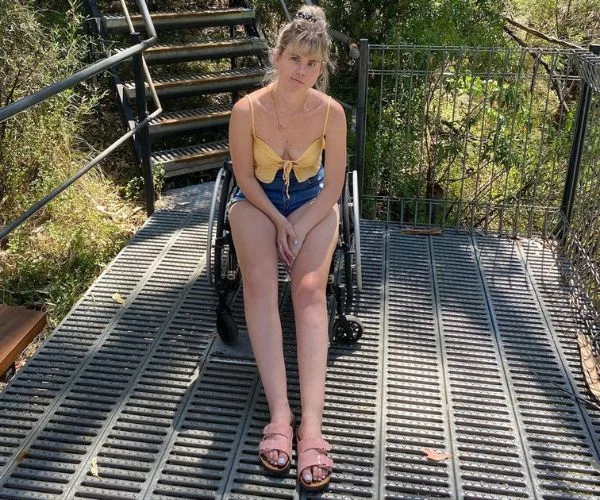
I’m starting to get my smile back. (Image: supplied)
In October 2021 I had facial reanimation surgery which involved putting muscle, with nerves and arteries, from my leg into my cheek in the hope that, with nerve regeneration and regular training with a speech therapist, I’d get my smile back.
Before I went into hospital, people often complimented me on my big, beaming grin.
Now, it’s infuriating I can no longer show it, because when you’ve cheated death like I did, there’s so much to smile about!
I’m determined that one day, it will return.
I’ve even started taping up my cheeks to help re-train my muscles.
Considering doctors once doubted I’d survive, now I believe anything’s possible.
.jpg?fit=900%2C750)
